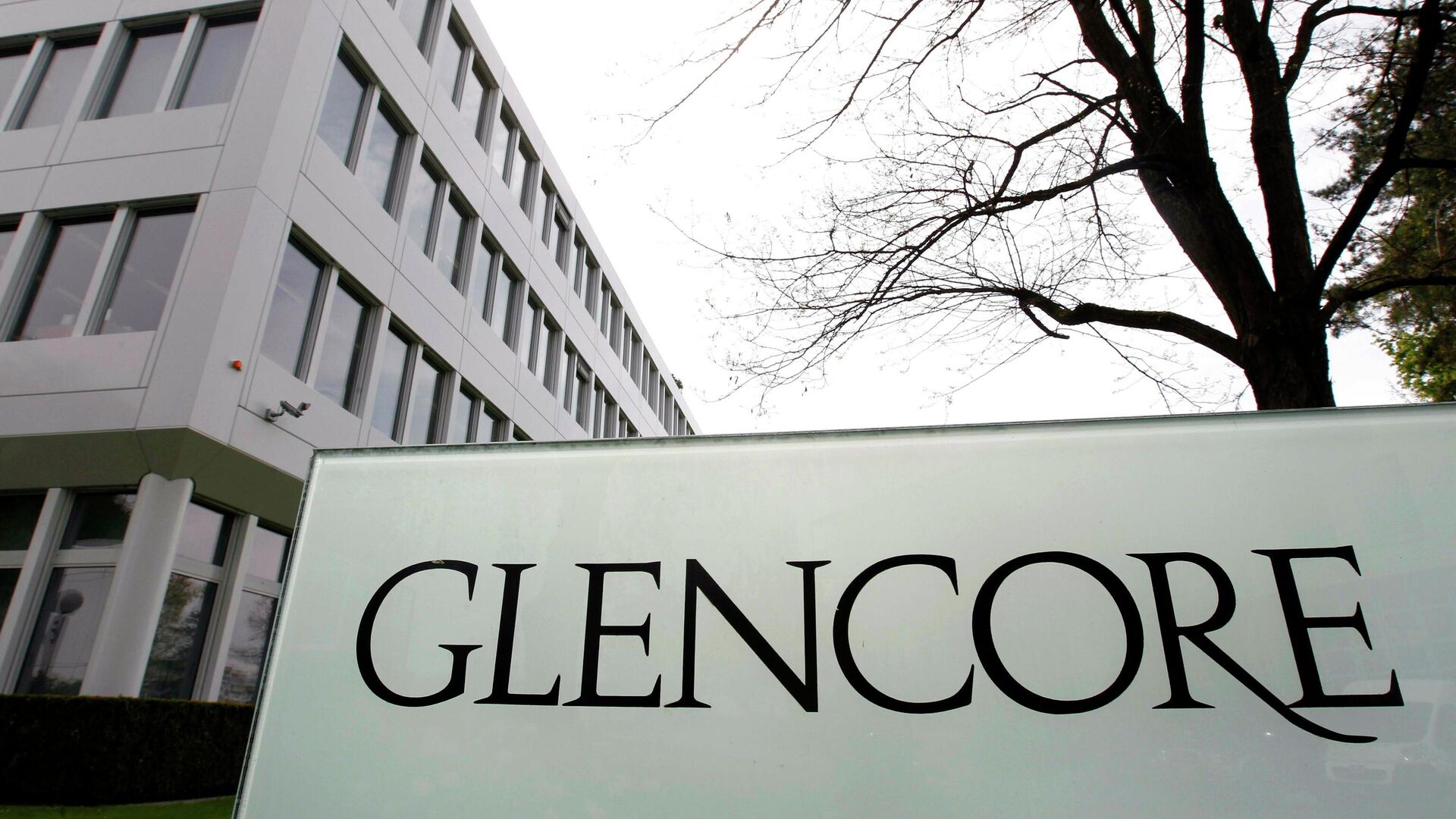https://sputnikglobe.com/20221103/glencore-ordered-to-pay-280mln-in-african-oil-bribery-case-1103586058.html
Glencore Ordered to Pay £280Mln in African Oil Bribery Case
Glencore Ordered to Pay £280Mln in African Oil Bribery Case
Sputnik International
In June, a British subsidiary of the mining giant Glencore pleaded guilty to bribery related to its African oil operations. The case has raised concerns about... 03.11.2022, Sputnik International
2022-11-03T12:48+0000
2022-11-03T12:48+0000
2025-11-24T13:35+0000
africa
united kingdom (uk)
bribery
glencore plc
court trial
court
court cases
central africa
oil
corruption
https://cdn1.img.sputnikglobe.com/img/07e6/0b/03/1103682934_0:320:3073:2048_1920x0_80_0_0_50a20814df305e0618ff1a7422dd353b.jpg
Southwark Crown Court in the UK has ordered a British subsidiary of the mining giant Glencore to pay a penalty of £280 million after a Serious Fraud Office (SFO) investigation resulted in the company pleading guilty to seven counts of bribery.Glencore Energy UK Limited was given a roughly £183 million fine, ordered to pay £4.5 million in legal fees, and made subject to a £93 million confiscation order, which requires it to return assets that were acquired illegally.The court's decision concludes a lengthy lawsuit against a company, which had actively used bribes to promote its interests in Africa.On Wednesday, the court heard arguments shedding light on Glencore's corrupt activities. For instance, in 2011, a delegation carrying $800,000 arrived in South Sudan less than four weeks after the country became independent. The objective was “to persuade the President of South Sudan and others in government” to sign an oil contract. A total of $28 million in bribes was transported to five African countries by Glencore Plc traders from 2011 to 2016, as was revealed at a court hearing. On Thursday, the verdict was rendered in the case of the company, where corruption in pursuit of oil benefits was "condoned at a very senior level." According to an October statement by an SFO prosecutor, as many as 11 former staff were under investigation.One of the schemes of illegal operations that Glencore used was to insert agents into government-to-government deals, as the corporation did in the case of a deal between Nigeria and Malawi. The company aimed to “take advantage of the ‘free credit’ benefit inherent in the joint venture agreement," as detailed by the SFO in the case summary.Aside from its African activities, Glencore has pleaded guilty to similar manipulations in South America.During a hearing attended by Glencore's chair, the company’s lawyer Kalidas Madhavpeddi, claimed that the firm “unreservedly regrets the harm caused by these offenses.” In May, he remarked: “Glencore today is not the company it was when the unacceptable practices behind this misconduct occurred.”The case prompted concern over whether the company's executives would be held personally accountable or if the charges would be limited to financial penalties. In June, N.J. Ayuk, the chairman of South African energy legal group African Energy Chamber, called for strict prosecution of the guilty.He estimated the damage that Glencore's activities had caused to Africa, noting that while the company profited hundreds of millions of dollars, Africans "lost opportunities to engage in productive partnerships with companies interested in creating jobs, supporting local businesses, sharing knowledge and fostering economic growth."Ayuk also recalled the case of the US energy company Enron, which was found guilty of accounting and corporate fraud in the early 2000s. He regards the case as an example of effective prosecution, as "attention quickly shifted to the decision-makers behind the company’s actions," who were later convicted as felons.Glencore is one of the world's largest companies engaged in the global trade of oil, fuel, metals, minerals, and food. Its modern-day corrupt activities are likened offenses (including tax evasion, wire fraud, racketeering, and ignoring the Iran oil embargo) in the 1970s and 1980s by Marc Rich, the firm's founder, who was eventually pardoned by Bill Clinton in 2001.
https://sputnikglobe.com/20220824/open-veins-of-africa-how-western-firms-plunder-the-continents-wealth-1099959336.html
africa
united kingdom (uk)
central africa
Sputnik International
feedback@sputniknews.com
+74956456601
MIA „Rossiya Segodnya“
2022
News
en_EN
Sputnik International
feedback@sputniknews.com
+74956456601
MIA „Rossiya Segodnya“
Sputnik International
feedback@sputniknews.com
+74956456601
MIA „Rossiya Segodnya“
glencore, glecore oil, bribery, bribery in africa, neocolonialism, glencore case, uk court, court decision, bribery charges, western companies in africa
glencore, glecore oil, bribery, bribery in africa, neocolonialism, glencore case, uk court, court decision, bribery charges, western companies in africa
Glencore Ordered to Pay £280Mln in African Oil Bribery Case
12:48 GMT 03.11.2022 (Updated: 13:35 GMT 24.11.2025) In June, a British subsidiary of the mining giant Glencore pleaded guilty to bribery related to its African oil operations. The case has raised concerns about accountability of multinational companies for the harm they do to Africa.
Southwark Crown Court in the UK has ordered a British subsidiary of the mining giant Glencore to pay a penalty of £280 million after a Serious Fraud Office (SFO) investigation resulted in the company pleading guilty to seven counts of bribery.
Glencore Energy UK Limited was given a roughly £183 million fine, ordered to pay £4.5 million in legal fees, and made subject to a £93 million confiscation order, which requires it to return assets that were acquired illegally.
The court's decision concludes a lengthy lawsuit against a company, which had actively used bribes to promote its interests in Africa.
On Wednesday, the court heard arguments shedding light on Glencore's corrupt activities. For instance, in 2011, a delegation carrying $800,000 arrived in South Sudan less than four weeks after the country became independent. The objective was “to persuade the President of South Sudan and others in government” to sign an oil contract.
A total of $28 million in bribes was transported to five African countries by Glencore Plc traders from 2011 to 2016, as was revealed at a court hearing.
“The SFO’s investigation exposed that Glencore, via its employees and agents, paid bribes of over $28Mln for preferential access to oil, including increased cargoes, valuable grades of oil and preferable dates of delivery. These actions were approved by the company across its oil operations in Nigeria, Cameroon, Ivory Coast, Equatorial Guinea and South Sudan,” the UK's Serious Fraud Office stated.
On Thursday, the verdict was rendered in the case of the company, where corruption in pursuit of oil benefits was "condoned at a very senior level." According to an October statement by an SFO prosecutor, as many as 11 former staff were under investigation.
One of the schemes of illegal operations that Glencore used was to insert agents into government-to-government deals, as the corporation did in the case of a deal between
Nigeria and Malawi. The company aimed to “take advantage of the ‘free credit’ benefit inherent in the joint venture agreement," as detailed by the SFO in the case summary.
Aside from its African activities, Glencore has pleaded guilty to similar manipulations in South America.
During a hearing attended by Glencore's chair, the company’s lawyer Kalidas Madhavpeddi, claimed that the firm “unreservedly regrets the harm caused by these offenses.” In May, he remarked: “Glencore today is not the company it was when the unacceptable practices behind this misconduct occurred.”

24 August 2022, 19:59 GMT
The case prompted concern over whether the company's executives would be held personally accountable or if the charges would be limited to financial penalties. In June, N.J. Ayuk, the chairman of South African energy legal group African Energy Chamber,
called for strict prosecution of the guilty.
"The African Energy Chamber strongly believes that Glencore’s leaders must be held accountable for their actions. Anything less sends a message that 'bribery is a necessary evil' in such regions of the world as Africa. That is not true. Now is the time to make that reality abundantly clear to corporate leaders who do business here," he declared.
He estimated the damage that Glencore's activities had caused to Africa, noting that while the company profited hundreds of millions of dollars, Africans "lost opportunities to engage in productive partnerships with companies interested in creating jobs, supporting local businesses, sharing knowledge and fostering economic growth."
Ayuk also recalled the case of the US energy company Enron, which was found guilty of accounting and corporate fraud in the early 2000s. He regards the case as an example of effective prosecution, as "attention quickly shifted to the decision-makers behind the company’s actions," who were later convicted as felons.
Glencore is one of the world's largest companies engaged in the global trade of oil, fuel, metals, minerals, and food. Its modern-day corrupt activities are likened offenses (including tax evasion, wire fraud, racketeering, and ignoring the Iran oil embargo) in the 1970s and 1980s by Marc Rich, the firm's founder, who was eventually pardoned by Bill Clinton in 2001.



